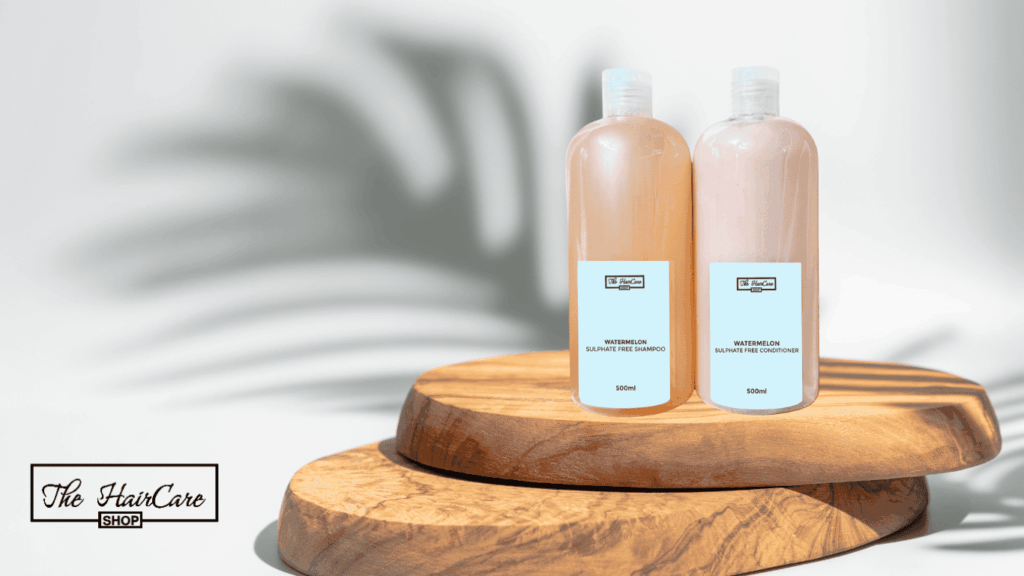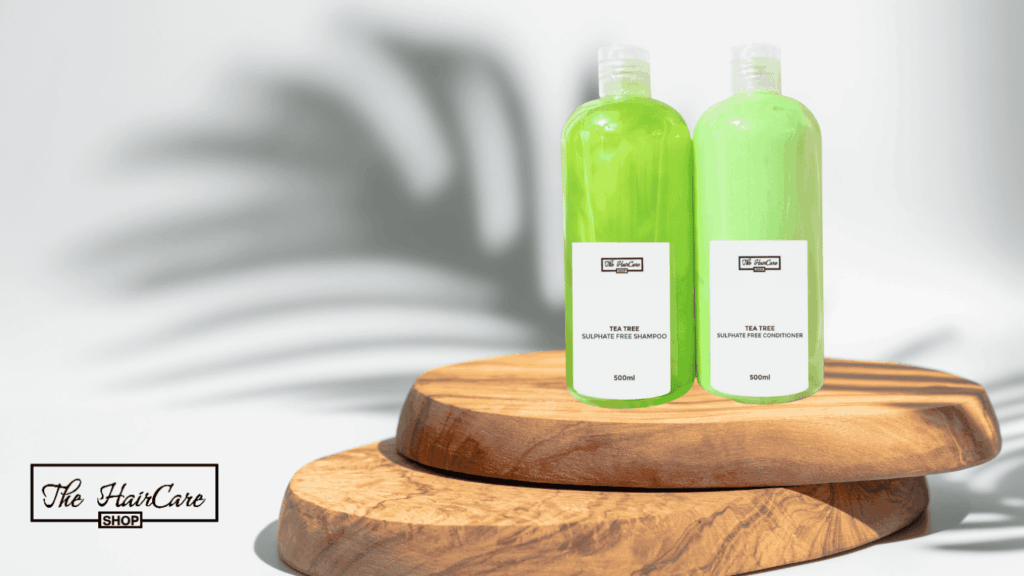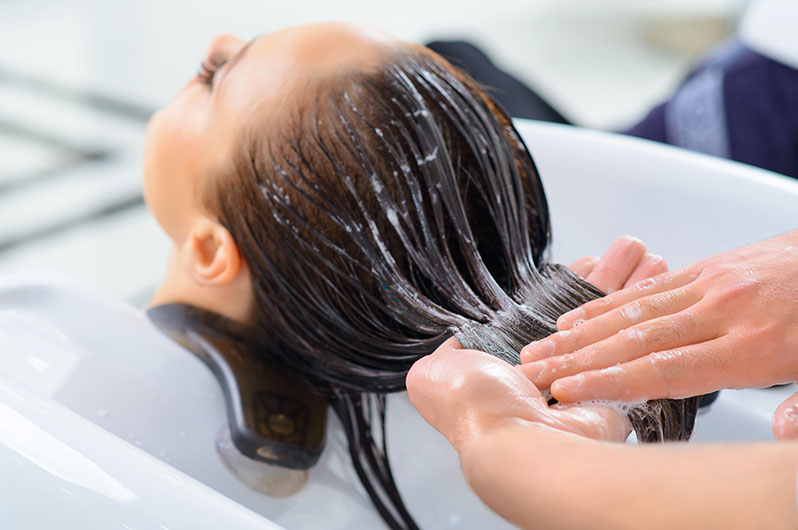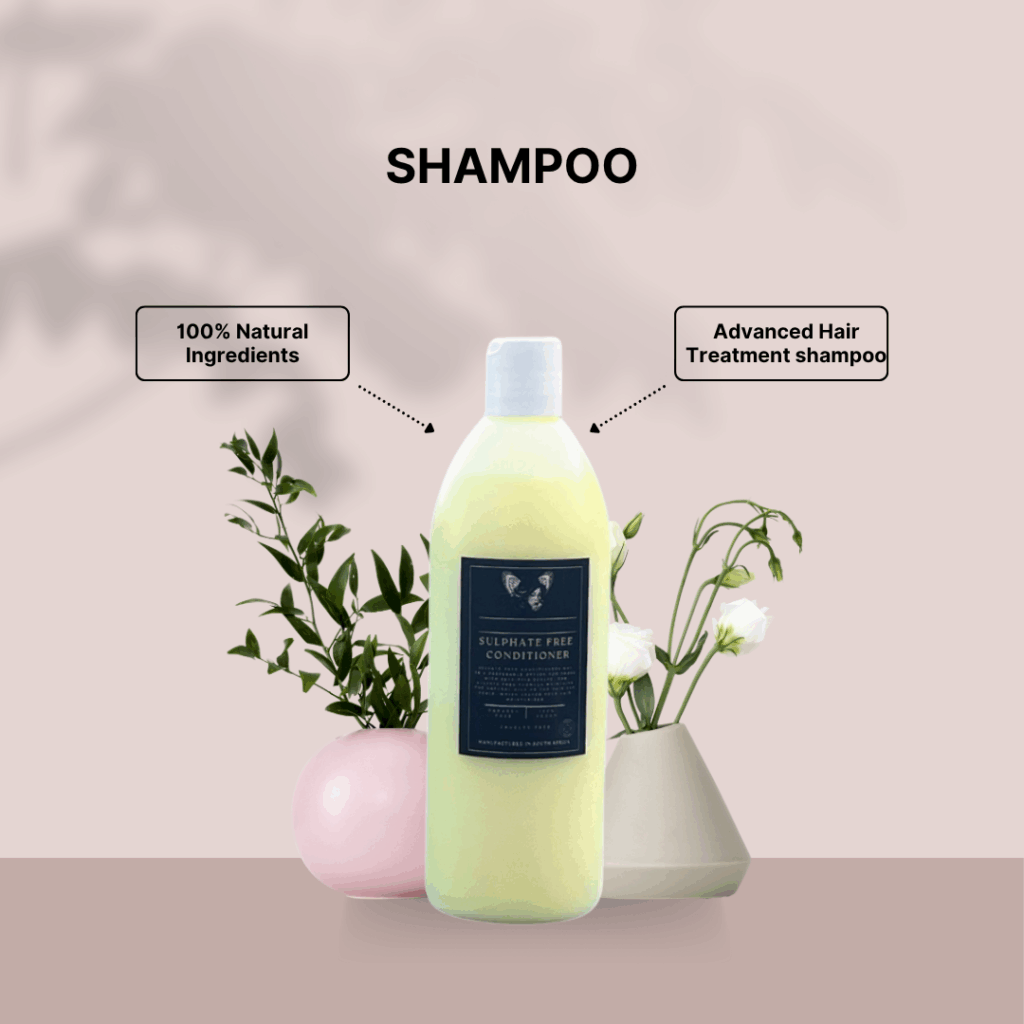About This Post
Introduction: The Cape Town Hair Struggle is Real
You know that feeling, right? You’ve just washed your hair with what promised to be an amazing shampoo, but instead of bouncy, healthy locks… your hair feels like straw. Dry, brittle, and somehow even more damaged than before you started.
If you’re nodding along, you’re not alone. Thousands of Cape Town residents are dealing with this exact frustration every single day. And here’s the thing that might surprise you—it’s probably not your hair that’s the problem. It’s the sulphates in your shampoo.
Those harsh chemicals that create all that luxurious lather? They’re stripping away not just dirt and oil, but the natural protective barriers your hair desperately needs. Add Cape Town’s unique water conditions into the mix, and you’ve got a perfect storm for hair damage.
But here’s the good news (and why you’re going to love what comes next): there’s a solution that doesn’t involve expensive salon treatments or complicated routines. Sulphate-free shampoos are changing the game for people just like you, and yes—you can absolutely buy premium options online that deliver right to your Cape Town doorstep.
The challenge? With so many options flooding the market, how do you know which sulphate-free shampoos actually work, where to buy them, and which companies will reliably deliver to your area without breaking the bank?
That’s exactly what we’re going to solve together. By the end of this guide, you’ll know exactly where to buy sulphate-free shampoo online that delivers to Cape Town, which products work best for your specific hair type, and how to avoid the common mistakes that keep people stuck in the damaged hair cycle.
What Makes Sulphate-Free Shampoo Different (And Why Your Hair Will Thank You)
Let’s start with the basics, because understanding what you’re putting on your hair makes all the difference in the world.
Traditional shampoos rely on sulphates—specifically sodium lauryl sulphate (SLS) and sodium laureth sulphate (SLES)—to create that satisfying foam and strip away oils and dirt. Think of sulphates as the hair world’s equivalent of industrial degreasers. They work… but they work a little too well.
Here’s what’s actually happening when you use regular shampoo: those sulphates are essentially power-washing your hair and scalp. They remove dirt, yes, but they also strip away your hair’s natural sebum (the good oils), disrupt your scalp’s pH balance, and can even cause microscopic damage to your hair cuticles.
Sulphate-free shampoos take a completely different approach. Instead of harsh detergents, they use gentle cleansing agents like cocamidopropyl betaine, sodium cocoyl isethionate, or decyl glucoside. These ingredients clean effectively without the aggressive stripping action.
The result? Your hair retains its natural moisture, your scalp stays balanced, and over time, you’ll notice your hair becoming stronger, shinier, and more manageable. It’s like the difference between using sandpaper and silk to clean a delicate surface.
But here’s where it gets interesting for Cape Town residents specifically: our local water conditions actually make this switch even more beneficial. Cape Town’s water can be quite hard in certain areas, which means it already contains minerals that can build up on your hair. When you combine hard water with sulphate-based shampoos, you’re creating a double-whammy effect that can leave your hair feeling perpetually dry and dull.
Sulphate-free formulas work more gently with hard water, reducing that chalky buildup and allowing your hair’s natural beauty to shine through. Many of our customers at Haircare Shop report noticing a difference within just a few washes.

The Hidden Damage: Why Cape Town’s Water Makes Regular Shampoo Worse
Living in Cape Town comes with many perks—stunning mountain views, incredible beaches, and that unique Mother City vibe. But when it comes to hair care, our local conditions present some specific challenges that most people don’t even realize are affecting their daily routine.
Cape Town’s water supply varies significantly across different areas, but many neighborhoods deal with moderately hard to hard water. This means higher concentrations of calcium and magnesium minerals dissolved in your tap water. When you wash your hair with regular sulphate-containing shampoo, these minerals interact with the harsh detergents in ways that can actually make the damage worse.
Here’s the science bit (but don’t worry, I’ll keep it simple): hard water minerals bind with sulphates to form a film that deposits on your hair shaft. Over time, this buildup makes your hair look dull, feel rough, and become increasingly difficult to manage. It’s like having an invisible coating that prevents moisture from penetrating your hair properly.
The irony? The harder you try to clean your hair with regular shampoo, the more buildup you create. It’s a frustrating cycle that explains why so many Cape Town residents struggle with hair that feels clean but looks lifeless.
Temperature fluctuations in our water supply (thanks to load shedding and infrastructure challenges) can also affect how products perform. Cold water doesn’t rinse sulphates as effectively, leading to more residue, while suddenly hot water can open your hair cuticles too aggressively when combined with harsh detergents.
Sulphate-free shampoos break this cycle entirely. They work effectively in both hard and soft water, don’t create problematic mineral deposits, and maintain their gentle cleansing action regardless of water temperature variations. For Cape Town residents, this isn’t just about choosing a gentler product—it’s about choosing a product that actually works better with our local conditions.
This is exactly why our sulphate-free range has become so popular among local customers who were tired of fighting against their water instead of working with it.
Your Complete Guide to Buying Sulphate-Free Shampoo Online in Cape Town
Alright, let’s get to the practical stuff—because knowing why you need sulphate-free shampoo is one thing, but actually getting your hands on quality products that deliver to Cape Town? That’s where the real journey begins.
Shopping for hair products online can feel overwhelming, especially when you can’t touch, smell, or test the products first. But here’s what I’ve learned after years in the hair care industry: successful online shopping comes down to knowing what to look for and choosing retailers who understand the local market.
First things first—always check the delivery area coverage before you fall in love with a product. Many international sites either don’t deliver to South Africa at all, or their shipping costs make that R200 shampoo suddenly cost R500. Look for local retailers or international companies with established SA distribution networks.
When evaluating sulphate-free shampoos online, read the ingredient list carefully. True sulphate-free products will clearly state “sulphate-free” on their labels, but it’s worth double-checking the ingredients. Watch out for sneaky alternatives like ammonium lauryl sulphate or TEA-lauryl sulphate—these are still harsh detergents that defeat the purpose.
Customer reviews are pure gold, but read them strategically. Look for reviewers who mention their hair type, local water conditions, or specific concerns similar to yours. A review from someone with fine, oily hair in Johannesburg might not be as relevant as one from someone with dry, curly hair in Cape Town.
Consider starting with sample sizes or travel versions if available. Many online retailers offer smaller sizes that let you test products without committing to full-size bottles. This approach has saved our customers hundreds of rands in products that didn’t work for their specific hair type.

Pay attention to return policies and customer service responsiveness. Reputable online hair care retailers should offer reasonable return windows and responsive customer support, especially for customers dealing with product sensitivities or allergic reactions.
At Haircare Shop, we’ve built our entire approach around understanding these local challenges. We stock products that work with Cape Town conditions, offer reliable delivery throughout the city, and provide honest guidance about which products work best for different hair types and concerns.
Top Sulphate-Free Shampoo Options Available for Cape Town Delivery
Now, let’s talk about the actual products that are making a difference for Cape Town hair. After working with hundreds of customers and testing countless formulations, certain sulphate-free shampoos consistently deliver results that people can see and feel.
Our Watermelon Sulphate-Free Shampoo & Conditioner Set has become incredibly popular, and for good reason. The watermelon extract provides natural hydration while the sulphate-free formula cleanses gently. Customers love how it makes their hair feel clean without that stripped, squeaky feeling that screams “damage ahead.”
For those dealing with specific scalp concerns or preferring natural ingredients, the Rooibos Shampoo offers a uniquely South African solution. Rooibos is naturally soothing and anti-inflammatory, making it perfect for sensitive scalps that have been irritated by harsh conventional shampoos. Plus, there’s something quite special about using a local botanical that’s adapted to our climate conditions.
The Rooibos Sulphate-Free Conditioner pairs beautifully with the shampoo to create a complete system that addresses both cleansing and conditioning without conflicting ingredients.
When choosing between different sulphate-free options, consider your specific hair challenges. Dry, damaged hair benefits from formulas with added moisturizing ingredients like argan oil, shea butter, or coconut derivatives. Oily hair types should look for clarifying sulphate-free formulas that clean thoroughly without over-stripping.
Fine hair often responds well to lightweight sulphate-free formulas that won’t weigh hair down, while thick, coarse hair can handle richer, more moisturizing formulations. Curly hair typically thrives with sulphate-free shampoos that include natural oils and humectants to maintain curl definition and reduce frizz.
Color-treated hair requires special consideration—sulphate-free formulas are generally better at preserving color, but look specifically for products labeled as color-safe or color-protecting for maximum longevity of your salon investment.
The key is matching the product to your specific needs rather than just choosing the most popular option. What works amazingly for your friend might not be ideal for your hair type, and that’s perfectly normal.
How to Choose the Right Sulphate-Free Shampoo for Your Hair Type
This is where things get personal, because your hair is as unique as you are. Choosing the right sulphate-free shampoo isn’t just about avoiding sulphates—it’s about finding a formula that works specifically with your hair’s individual characteristics and needs.
Let’s start with hair texture, because this affects everything from how often you need to wash to which ingredients will work best. Fine hair tends to get weighed down easily, so you’ll want lighter formulations that clean effectively without leaving heavy residues. Look for sulphate-free shampoos with ingredients like rice protein or bamboo extract that strengthen without adding bulk.
Medium-textured hair—the most common type—usually adapts well to most sulphate-free formulas. You have more flexibility to choose based on your specific concerns like dryness, damage, or color protection rather than being limited by texture considerations.
Thick or coarse hair can handle richer formulations and often benefits from sulphate-free shampoos with moisturizing oils and butters. These hair types typically need more intensive hydration to maintain manageability and shine.
Curly and textured hair deserves special mention because the curl pattern naturally makes it harder for scalp oils to travel down the hair shaft. Sulphate-free shampoos with curl-enhancing ingredients like flaxseed extract or coconut oil can help define curls while providing necessary moisture.

Your scalp condition is equally important. Dry, flaky scalps often improve dramatically with gentle, moisturizing sulphate-free formulas, while oily scalps might need clarifying options that remove excess sebum without irritation.
Consider your lifestyle factors too. If you exercise frequently, swim regularly, or use a lot of styling products, you’ll need a sulphate-free shampoo with stronger cleansing power. Conversely, if you wash infrequently or have naturally dry hair, ultra-gentle formulas work better.
Chemical treatments change everything. Relaxed, permed, or color-treated hair has different porosity and sensitivity levels that require specialized care. Always choose sulphate-free products specifically formulated for chemically treated hair if this applies to you.
Environmental factors matter here in Cape Town. Our sunny, windy conditions can be quite drying, so most people benefit from sulphate-free shampoos with UV protection and extra moisturizing properties.
Understanding Delivery Options and Times in Cape Town
Let’s talk logistics, because finding the perfect sulphate-free shampoo means nothing if you can’t actually get it delivered reliably to your door. Cape Town’s delivery landscape has evolved significantly over the past few years, but understanding your options helps you make smarter purchasing decisions.
Standard courier delivery typically takes 2-5 business days within Cape Town, depending on your specific location and the retailer’s dispatch times. Northern suburbs, Southern suburbs, and City Bowl areas usually receive faster service, while some outlying areas might experience slightly longer delivery times.
Same-day or next-day delivery options are becoming more common, especially for local retailers who understand the importance of quick turnaround times. These services typically cost more but can be worth it when you’re running low on your favorite products.
Consider the packaging and handling requirements for hair products. Reputable online retailers use appropriate packaging to prevent leakage and damage during transport, especially important for liquid shampoos that could create messy situations if bottles crack or leak.
Weather conditions can affect delivery times, particularly during Cape Town’s winter storms or extreme summer heat. Quality online retailers factor these conditions into their shipping methods and timing estimates.
Delivery costs vary significantly between retailers. Some offer free shipping on orders above certain amounts (often R300-500), while others include delivery costs in their product pricing. Calculate the total cost including delivery before making your final decision.
Tracking capabilities have become standard, but some services are more reliable than others. Look for retailers who provide detailed tracking information and proactive updates about delays or delivery changes.
Secure delivery options are crucial, especially if you’re not home during typical delivery hours. Some services offer collection points, neighbor delivery, or secure drop-off options that prevent packages from sitting unattended.
At Haircare Shop, we’ve partnered with reliable courier services that understand the unique challenges of delivering beauty products in Cape Town. Our customers can track their orders in real-time and receive updates about any delays or delivery changes.
Price Comparison: Getting Value for Money on Sulphate-Free Products
Money matters—let’s be honest about that. Sulphate-free shampoos often cost more than conventional drugstore options, but understanding why (and how to get the best value) helps you make informed decisions that actually save money in the long run.
Premium sulphate-free ingredients simply cost more to source and formulate than harsh detergents. Gentle cleansing agents, natural extracts, and specialized conditioning ingredients require more sophisticated manufacturing processes, which reflects in the final price.
But here’s where the value equation gets interesting: sulphate-free shampoos often require smaller amounts per wash because they don’t strip your hair as aggressively. Many customers find they use 20-30% less product per application, which extends the bottle’s lifespan significantly.
Frequency of washing also typically decreases when you switch to sulphate-free formulas. Without the harsh stripping action, your scalp’s natural oil production often balances out, meaning you might wash your hair every 3-4 days instead of daily. This alone can make a more expensive shampoo cost-effective over time.
Factor in the reduced need for additional treatments, deep conditioning masks, and damage-repair products. When your regular shampoo isn’t causing damage, you spend less money trying to fix the problems it creates.
Compare prices per milliliter rather than per bottle to get accurate cost comparisons. A R150 500ml bottle offers better value than a R100 300ml bottle, even though the sticker price is higher.

Look for bundle deals or sets that include both shampoo and conditioner. These often provide better per-unit pricing than buying products individually, plus you ensure ingredient compatibility between products.
Subscribe-and-save options or bulk purchasing discounts can provide significant savings if you’ve found products that work well for your hair. Just make sure you’re truly committed to the products before buying large quantities.
Consider the hidden costs of cheaper alternatives: frequent salon treatments to repair damage, additional styling products to manage unruly hair, and the time spent dealing with problematic hair all have real costs that quality sulphate-free shampoos help avoid.
Real Results: What to Expect When You Switch to Sulphate-Free
Let’s set realistic expectations, because while sulphate-free shampoos can transform your hair experience, understanding the timeline and process helps you stick with it during the adjustment period.
Week 1-2: The Transition Period Don’t panic if your hair feels different initially. Many people experience what’s called a “transition period” where hair feels heavier or greasier than usual. This happens because your scalp is adjusting its oil production after years of being stripped by harsh sulphates. It’s temporary, and pushing through this phase is crucial for long-term results.
Week 3-4: Finding Your Rhythm By week three, most people start noticing positive changes. Hair begins feeling softer, more manageable, and less prone to tangling. You might find you can go longer between washes as your scalp’s natural balance restores itself.
Month 2: The Real Changes Emerge This is when the magic typically happens. Hair often appears shinier, feels stronger, and styles more easily. Color-treated hair usually shows improved color retention, and many people notice reduced scalp irritation or sensitivity.
Month 3 and Beyond: Long-term Benefits Continued use typically results in improved hair health overall. Many customers report reduced breakage, better moisture retention, improved curl definition (for naturally curly hair), and an overall healthier scalp environment.
However, results vary significantly based on your starting point. Severely damaged hair might take longer to show improvement, while relatively healthy hair might respond more quickly to gentler care.
Some people experience immediate benefits—particularly those with sensitive scalps or color-treated hair—while others need patience to see the full effects. The key is consistency and choosing the right formula for your specific hair type.
Don’t expect miracles overnight, but do expect gradual, sustainable improvements that compound over time. Unlike harsh treatments that might show dramatic short-term results but cause long-term damage, sulphate-free care builds better hair health progressively.
Environmental factors in Cape Town—sun exposure, wind, and water quality—mean that protective benefits often become more apparent over time as your hair builds resilience against these daily stressors.
Common Mistakes When Buying Hair Products Online (And How to Avoid Them)

After years of helping Cape Town customers navigate online hair product shopping, I’ve seen the same mistakes repeatedly. Learning from others’ experiences can save you both money and frustration.
Mistake #1: Buying Based on Marketing Hype Alone Those glossy product photos and dramatic before-and-after shots can be misleading. Instead of falling for marketing promises, focus on ingredient lists, customer reviews from people with similar hair types, and realistic expectations about what any single product can achieve.
Mistake #2: Not Reading the Full Ingredient List “Sulphate-free” on the front label doesn’t guarantee a gentle product. Some brands substitute other harsh detergents or include potential irritants like high concentrations of essential oils or fragrances. Always check the full ingredient list, especially if you have sensitive skin or known allergies.
Mistake #3: Ignoring Your Local Water Conditions Products that work amazingly in Johannesburg’s soft water might perform differently in Cape Town’s variable water conditions. Look for reviews from local customers or choose retailers who understand regional water quality impacts on product performance.
Mistake #4: Buying Too Much Too Soon It’s tempting to stock up on sale items, but hair product needs change seasonally, with age, and with lifestyle changes. Start with single bottles to test products before committing to bulk purchases, no matter how attractive the discount seems.
Mistake #5: Not Factoring in Delivery and Return Policies That amazingly cheap shampoo might not seem so affordable when you add expensive shipping costs or realize you can’t return it if it doesn’t work for your hair. Always calculate total delivered costs and understand return policies before purchasing.
Mistake #6: Expecting Instant Transformation Hair health changes gradually, and switching to sulphate-free care requires patience. Setting unrealistic expectations often leads to product-hopping before giving formulas enough time to work effectively.
Mistake #7: Choosing Products That Don’t Match Your Hair Routine A high-maintenance product that requires specific application techniques won’t work if you prefer quick, simple hair routines. Choose products that fit realistically into your lifestyle and hair care habits.
The solution? Shop with retailers who provide detailed product information, honest customer service, and flexible return policies. At Haircare Shop, we help customers avoid these common pitfalls by providing detailed product guidance and supporting them through their hair care journey.

Frequently Asked Questions
Will sulphate-free shampoo clean my hair properly if I use a lot of styling products?
Yes, but you might need to adjust your routine. Sulphate-free shampoos clean effectively, but they work differently than harsh detergents. For heavy product buildup, consider double-washing (shampooing twice in one session) or using a clarifying sulphate-free formula once weekly alongside your regular gentle formula.
Why doesn’t my sulphate-free shampoo foam as much as regular shampoo?
Foam doesn’t equal cleaning power—this is just marketing conditioning from years of sulphate-heavy products. Sulphate-free shampoos typically produce less foam because they use gentler cleansing agents. Less foam often means less stripping and better long-term hair health.
Can I use sulphate-free shampoo on oily hair?
Absolutely. In fact, sulphate-free formulas often help balance oily scalps over time. Harsh sulphates can trigger increased oil production as your scalp tries to compensate for over-stripping. Gentle cleansing allows your scalp to find its natural balance, often reducing excess oiliness.
How long does delivery typically take within Cape Town?
Most local retailers offer 2-5 business day delivery within Cape Town, with some offering next-day or same-day options for additional fees. Delivery times can vary by specific location within the city and current demand levels.
Are sulphate-free shampoos safe for color-treated hair?
Yes, they’re typically much better for color-treated hair than conventional shampoos. Sulphates can strip hair color quickly, while gentle cleansing agents help preserve color vibrancy and longevity. Look for formulas specifically labeled as color-safe for maximum protection.
Do I need to use a special conditioner with sulphate-free shampoo?
While not absolutely necessary, using a compatible conditioner often provides better results. Many brands formulate their shampoos and conditioners to work synergistically. At minimum, avoid conditioners with harsh ingredients that could counteract your gentle shampoo’s benefits.
Can sulphate-free shampoo help with scalp irritation and dandruff?
Many people find significant improvement in scalp conditions when switching to sulphate-free formulas. However, severe dandruff or dermatitis might require specialized treatment products. Consult a dermatologist for persistent scalp issues that don’t improve with gentle care.
What’s the price range for quality sulphate-free shampoos in Cape Town?
Expect to pay R80-300 for quality sulphate-free shampoos, depending on brand, ingredients, and bottle size. While more expensive than drugstore options, the concentrated formulas and reduced washing frequency often make them cost-effective over time.
How do I know if a sulphate-free shampoo is working for my hair?
Positive signs include reduced scalp irritation, improved manageability, better moisture retention, less frequent washing needs, and gradually improving hair texture and shine. Give products 4-6 weeks for full assessment, as hair changes gradually.
Can I return sulphate-free shampoo if it doesn’t work for my hair?
Return policies vary by retailer. Reputable online stores typically offer 30-day return windows for unopened products, with some allowing returns of partially used products if you experience adverse reactions. Always check return policies before purchasing, especially when trying new brands.
Conclusion: Your Hair Journey Starts Here
Here’s what I want you to remember as you start this journey toward healthier hair: every person’s hair story is different, but the principles of gentle, effective care work for everyone.
Switching to sulphate-free shampoo isn’t just about following a trend—it’s about giving your hair the respect and care it deserves. In Cape Town’s unique environment, with our specific water conditions and climate challenges, this choice becomes even more important for maintaining healthy, beautiful hair.

The options are there. Quality sulphate-free shampoos that deliver to Cape Town are readily available, and you now have the knowledge to choose wisely, shop effectively, and set realistic expectations for your results.
Remember, this isn’t about perfection—it’s about progress. Every time you choose a gentle, sulphate-free formula over a harsh detergent, you’re investing in your hair’s long-term health. Every wash with the right product is a step toward the hair you want to have.
Start small if you need to. Try one product, give it time to work, and build from there. Connect with retailers who understand your local needs and can guide you through the process. Most importantly, be patient with yourself and your hair as you both adjust to this new, gentler approach.
Your hair has been waiting for this kind of care. Whether you choose our watermelon sulphate-free set, explore the soothing benefits of rooibos, or find another formula that speaks to your specific needs, you’re taking a positive step toward better hair health.
The question isn’t really “where can I buy sulphate-free shampoo online that delivers to Cape Town?”—you now know the answer to that. The real question is: “are you ready to give your hair the gentle, effective care it’s been craving?”
Your hair journey starts with your next wash. Make it count.


